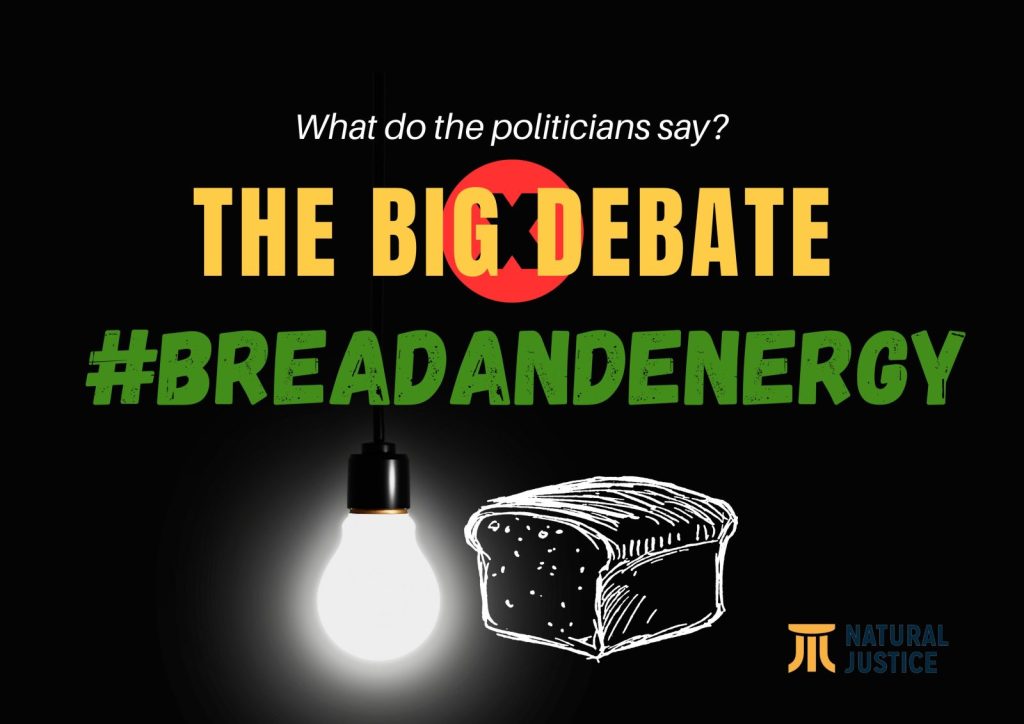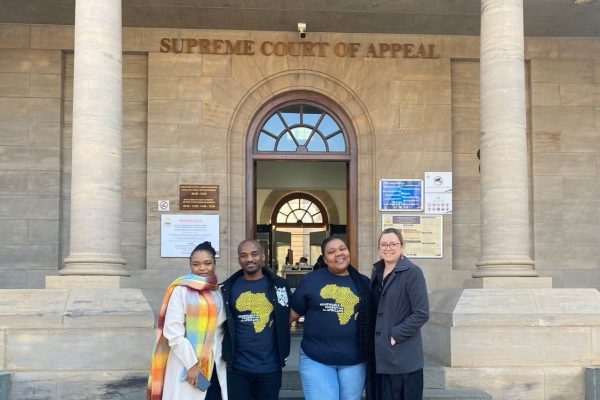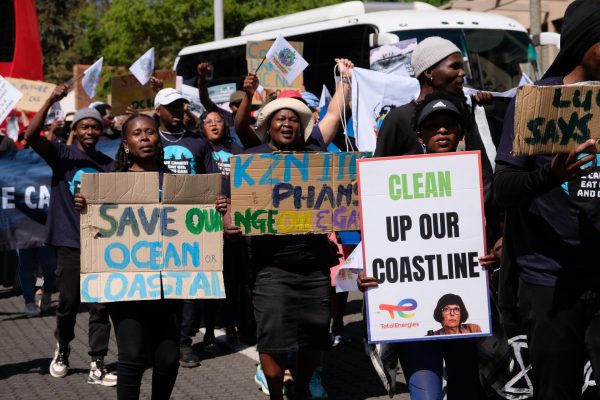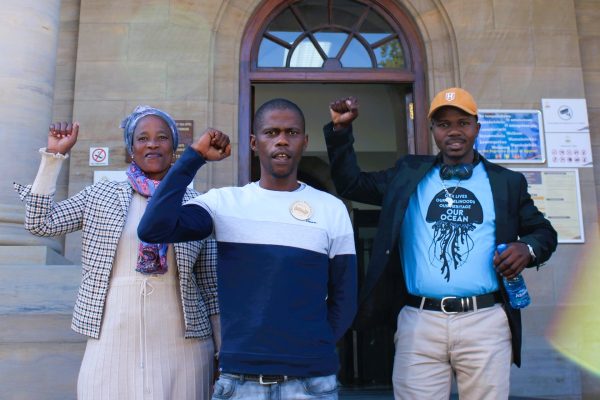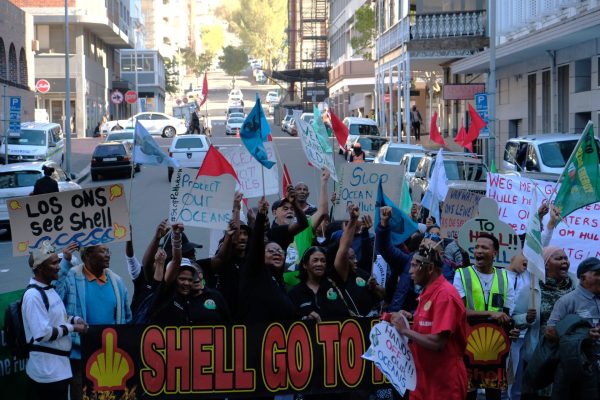On 29 May 2024, the national elections for South Africa will take place, with voters deciding on the political party or independent candidate that will be in power for the next five years. The votes will determine who has representation in parliament and at the provincial legislatures – where laws and policies are made and passed.
WHY BREAD AND ENERGY?
In South Africa, there is an energy crisis which is ongoing, with electricity supply over the last few years not meeting demand. While loadshedding has eased in recent months, the ruling party will have a big task on their hands to meet demand in future. The energy supply is made up of fossil fuels, with coal at 67% of the energy mix (in 2019) as stated in the 2022 South Africa Energy Sector Report. Moving forward, South Africa will need to adopt an energy transition away from fossil fuels towards green energy solutions.
With the energy crisis is an employment crisis: with a national average rate of 32,9% unemployment in the first quarter of 2024, the highest figures of employment being amongst young individuals (15–34 years) at 45,5% and young females at 49,4% (StatsSA).
This is why it is important to highlight issues of energy and bread – basically how do we have an urgently-needed just energy transition that keeps people employed, sustains the economy and gives much needed energy access to all.
Please join Natural Justice, with our partners, from 13:00 to 14:00 on Friday 24 May 2024 as we pose questions to political parties on their manifestos relating to issues on bread and energy. You are welcome to join the debate.
MANIFESTOS ON ENERGY GENERALLY
It is generally agreed that we need to move away from fossil fuels, promote renewable energy and protect the environment.
Some political are pushing both fossil fuels and renewable energy to secure as much energy as possible. The African National Congress (ANC) wants to build both renewable and fossil fuel energy sources, including gas and nuclear.
The Economic Freedom Fighters (EFF) seems to take a similar stance as the ANC with a big push for nationalisation, such as a state-owned bank and mining company. It favours baseload energy derived from coal, with carbon-capturing technology and nuclear energy. It seeks to move away from carbon emissions in the electricity sector but at a pace, scale and cost that is feasible and beneficial to South Africa.
The Inkatha Freedom Party (IFP) seeks a diversified and mixed energy system which includes renewable energy like solar and wind, gas for cooking and heating, recognising coal as a key source of energy and ensuring nuclear remains in the mix and in the hands of the state.
Other parties are pushing for a faster transition. The Democratic Alliance (DA) favours renewable energy, privatisation of energy and moving away from Eskom through a push for “prosumers” (consumers who make excess energy which could be sold to others).
The GOOD party seeks to end loadshedding by using renewable energy, and not extending the life of existing coal plants. GOOD also wants an increased transition to electric vehicles.
ActionSA promotes the use of renewable energy, creating a competitive and decentralised energy market, and private-public partnerships to achieve this.
Rise Mzanzi seeks a shift to a decentralised energy system which has a balanced, green energy mix with coal decreasing and renewable energy increasing. Its states that it is open to the role of gas and small nuclear modular reactors.
The only party to not agree to a shift from fossil fuel energy to low carbon energy is the uMkhonto weSizwe Party (MK) party which wants to reverse and rescind what it calls the “unjust transition” from coal, renew the coal fleet and accelerate the nuclear programme.
What are the plans to ensure we have a transition which creates energy access to meet basic needs of communities and supports local economy and labour in the transition, more specifically communities who are living in poverty?
ENERGY ACCESS AND BASIC NEEDS
When it comes to energy access to meet basic needs, across manifestos the following points are advocated for and can be highlighted:
Access to basic services (energy): The ANC (Page 31 manifesto), IFP (Page 15, 24 manifesto), the MK (Page 11 manifesto), the EFF (Page 45, 46 manifesto), Rise Mzansi (Page 54 manifesto) and the GOOD party (Page 3 manifesto) mention giving access to basic services, including energy, calling for it to either be affordable or in some cases free.
ActionSA (Page 20, 37 manifesto) calls for uninterrupted energy supply for essential services and that affordable and reliable electricity is needed for a quality life.
IFP (Page 15 manifesto) specifically mentions the use of gas for cooking and heating.
Subsidisation of electricity: The ANC (Page 8, 31 manifesto) seeks cheaper and subsidised renewable energy, specifically subsidisation of electricity to tackle the high cost of living by unemployed persons, women-headed households and the middle class.
The IFP (Page 14 manifesto) wants subsidisation of electricity for poor households. The EFF (Page 44, 46 manifesto) states the need for a grant system/subsidisation for embedded generation technologies, which can either be fossil fuel or renewable energy sources.
Solar energy: The ANC (Page 25 manifesto) wants poor and working-class households to have solar geysers. ActionSA (Page 9, 37 manifesto) stipulates the same for low-income households. The IFP (Page 15 manifesto) and ActionSA (Page 9, 37 manifesto) both call for solar panels for low-income households.
Off grid solutions: The EFF (Page 47 manifesto) promotes off-grid and institutional energy solutions while ActionSA (Page 9,37 manifesto) wants a framework to allow for private companies to build small, local energy grids to serve small areas.
Prosumers: The DA (Page 16 manifesto) states that there needs to be a promotion of prosumers, making energy more affordable to poorer households while Rise Mzansi (Page 54 manifesto) calls for low-income communities developing their own energy cooperatives being prosumers.
Only ActionSA (Page 38 manifesto) speaks to public participation of communities in energy planning and implementation of the energy transition.
ECONOMY AND EMPLOYMENT
When it comes to boosting the economy and livelihoods:
Job creation/skills development in energy: The ANC (Page 23, 25 manifesto) states job creation in the installation of solar geysers and the just transition generally. The EFF’s (Page 47, 118 manifesto) manifesto mentions many areas of job creation from solar installations, increasing women and youth artisan and engineers at Eskom and the production of embedded generation and off-grid solutions.
Skills development: Through research and development of fossil fuel energy, renewable energy, nuclear and coal baseload energy jobs can be created, reserved for women and youth – as is argued by the EFF (Page 46, 117, 118 manifesto). The DA (Page 17 manifesto) speaks to training and development of skills capacity in the renewable energy sector. ActionSA (Page 38, 39 manifesto) seeks reskilling of workers in the fossil fuel energy value chain to take up other forms of employment and working with international experts.
Localisation: Many parties including the ANC (Page 24 manifesto), the EFF (Page 37, 116 manifesto), the DA (Page 17 manifesto) and Rise Mzansi (Page 34, 37 manifesto) see a future in local manufacturing of goods like renewable energy, energy efficiency products, and other energy products.
Exports: There is a need highlighted to be more competitive with exports and export taxes on products for just energy transitions by the ANC (Page 23 manifesto) and by ActionSA (Page 5 manifesto).
Just transition: Support for communities and workers affected in the transition to low-carbon economy are seen as priorities by the EFF (Page 45 manifesto), the IFP (Page 32 manifesto) and ActionSA (Page 9, 38 manifesto). The GOOD party (Page 9 manifesto) points out the need for developed countries to have to pay for the transitions in the developing world, including South Africa.
Finances: The ActionSA (Page 36 manifesto) points out that economic growth could be found through foreign investment. The EFF (Page 45 manifesto) supports private electricity generation as long as there is black majority ownership. Further the EFF (Page 46 manifesto) calls for all of the debts to Eskom to be eliminated.
CONCLUSION
No matter where you lay your X to vote, what is most important is that the most vulnerable and in need are prioritised, especially women and the youth, when it comes to securing energy access for basic services and ensuring that the energy transition leaves no one behind. Even if your party does not win, they can still have power in the making and deciding of laws, like those that are likely to influence an energy transition.
It is worrying that only one party mentions the importance of public participation in energy planning and implementation through the transition. If there is to be a just energy transition, there needs to be public participation when it comes to energy planning, energy implementation, energy projects and the economies built around the energy industry. Parties need to include public participation, as this is a basis for democratic decision-making.
None of the parties have a full and comprehensive plan for bread and energy. Each party has elements of the energy transition within the manifesto, but some miss the “just” element that is so important for a country like South Africa. The “just” elements needed include energy planning and implementation with meaningful public participation, so the needs of communities are met and consideration of labour and employment.
The energy transition not only requires policy, but also budget. Parties need to consider their sources of finance and ways that they can subsidise energy supply. Subsidised/free energy access cannot be promised without the means to provide this. Further energy access needs to give communities the opportunities to grow their economies and livelihoods.
Localisation and job creation need to not only be able to replace the formal labour that will be lost during an energy transition, but also create opportunities for informal workers and those who are unemployed, highlighting women and youth.
Lastly, energy justice is needed for the earth’s temperatures to stay below 2 C in terms of the commitments to the Paris Climate Agreement. In South Africa, communities are paying the price for an unhealthy environment created by fossil fuels and coal energy. The dependence of South Africa on fossil fuels needs to be addressed for the sake of communities’ health and the environment.
If you would like to read more about what South Africa has framed a just transition to look like, please see the Framework for a Just Transition in South Africa, a Presidential Climate Commission Report. The three main principles highlighted for a just transition are: distributive, restorative and procedural justice.
REREFENCES
- ANC Manifesto – https://www.anc1912.org.za/wp-content/uploads/2024/02/ANC-2024-Elections-Manifesto.pdf
- DA Manifesto – https://cdn.da.org.za/wp-content/uploads/2024/02/16143750/DA-Election-Manifesto-2024.pdf
- EFF Manifesto – https://effonline.org/wp-content/uploads/2024/02/A5-EFF-2024-Manifesto-full-version.pdf
- IFP manifesto – https://www.ifp.org.za/wp-content/uploads/2024/03/Inkatha-Freedom-Party-2024-Manifesto.pdf
- MK manifesto – https://mkparty.org.za/wp-content/uploads/2024/04/MK-Manifesto-The-Peoples-Mandate-Paths-Final-2.pdf
- Rise Mzansi manifesto – https://assets.website-files.com/6512abc58b1468c2e0784360/65ab627c5faa95ea313ab276_RISE%20Mzansi%20Manifesto%20%2B%20.pdf
- ActionSA manifesto – https://www.actionsa.org.za/wp-content/uploads/2024/03/ActionSA-National-Manifesto-2024.pdf
- The GOOD party – https://cisp.cachefly.net/assets/articles/attachments/92575_manifesto-2024-15-mar.pdf

